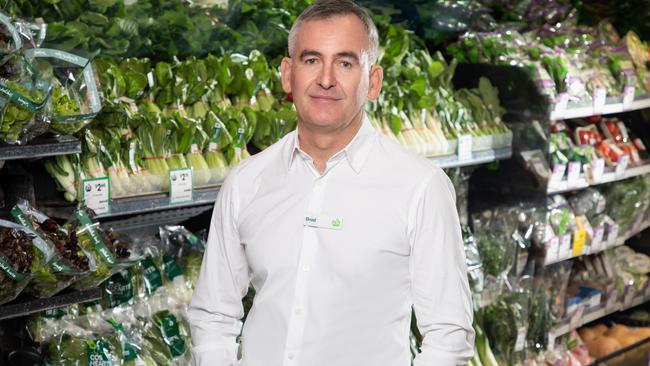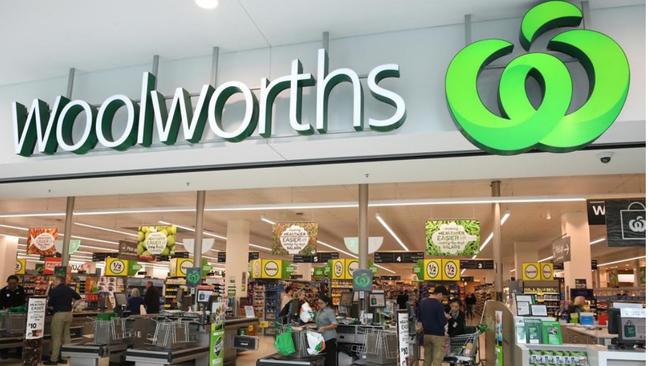Woolworths lifts dividend but warns inflation was impacting customer shopping behaviour
The boss of the nation’s largest supermarket chain says consumers are buying cheaper label beauty and grocery brands, canned and frozen food to cope with pressures on household budgets.
The boss of the nation’s largest supermarket chain Woolworths says consumers are dipping more into cheaper private label groceries, canned and frozen food, as well as cheaper beauty and cosmetics to cope with soaring interest rates and pressures on household budgets.
Chief executive Brad Banducci said on Wednesday the growth in some of his supermarket’s private label groceries had “exploded” and been “extraordinary” over the December half with some grocery categories up more than 20 per cent, led by popular and value-focused grocery lines such as canned tuna, tinned tomatoes and pasta.
“When you get to some other categories, the growth (in private label) has been extraordinary. Whether it’s our canned tuna … just amazing in some key categories, you know, whether it’s canned tomatoes, or whatever the case may be.
“Where we really overdeliver for our customers, they find the value, and we see the growth really explode,” Mr Banducci said.
Strains on the economy and consumer wallets are starting to show their impact through the supermarket aisle to influence what goes in shoppers baskets and trolleys, however Woolworths believes it has the right products at the right price points to weather the inflationary storm.

The growing strength of the retail giant was on full display on Wednesday when it unveiled its interim results, with its key Australian supermarkets arm showing double-digit earnings growth, its once problem child Big W lifting its profitability more than five fold and its burgeoning B2b food business doubling earnings.
The only weakness was a slump in earnings at its New Zealand supermarkets and a growth in losses to $85m from $69m at a collection of smaller business that include data analytics business Quantium and its recently acquired online marketplace MyDeal.
Woolworths booked a 4 per cent rise in interim revenue to $33.17bn as statutory profit dropped 88 per cent to $845m, which reflects the impact of the demerger of its drinks and pubs arm Endeavour.
Profit from continuing operations, which analysts track, jumped nearly 25 per cent to $845m, led by strong double-digit earnings growth at its bulwark Australian supermarkets arm which was also supported by robust sales growth and a large decrease in Covid-19-related costs.
Woolworths declared a stronger interim dividend of 46c per share, up from 39c, and payable on April 13.
Big W, which only a few years ago had rung up tens of millions of dollars in losses, saw its first-half earnings rocket 437.5 per cent to $134m. Metro food stores sales jumped more than 17 per cent to $574m, supported by new store growth, a gradual recovery in ‘On the Go stores’ and enhancements to the neighbourhood format.
At its B2b business, which includes its food delivery services, sales rose 23 per cent to $2.43bn and earnings doubled to $38m.
Woolworths for the first time broke out the performance of its WooliesX online and digital arm. The division posted a 6.3 per cent fall in sales to $2.52bn as earnings fell 30.4 per cent to $83m, partly driven by shoppers returning to physical stores instead of buying online as lockdowns ended.
Its Australian supermarkets, the driving force for Woolworths group earnings, were the star performer with earnings up 18 per cent to $1.43bn and sales up 2.5 per cent to $24.39bn. Food margins were greatly stronger, up 48 basis points in the half to 30.7 per cent. On the inflationary front, food inflation continued to rise during the half reflecting industry-wide cost pressures with second quarter average price growth of 7.7 per cent, marginally higher than first quarter growth of 7.3 per cent.

Reacting to inflationary these pressures, steeper mortgage payments and other living costs, belt tightening - or a ‘search for value’ - accelerated as children went back to school this year, Mr Banducci added, while in the last two weeks there had also been a noticeable shift in people buying up groceries to cook at home rather than spend money at restaurants and cafes.
And this was across most demographics and household income levels.
“Every person or family is finding value in their own way. What they value becomes the question. Some people value eating out, some people value the experience of travelling, whatever it is, everyone is looking for value but it’s not always the same thing,” Mr Banducci said.
“And that’s what is really intriguing to me and you can see it in a very pronounced way.”
He said Woolworths Macro organic range was selling strongly, as was ranges of its private label Thomas Dux cheese selections, pointing to many people from all income levels looking to save money when they shop. The Woolworths beauty and cosmetics private label brand Mco was also selling strongly.
“And for other people a 90c can of home brand tuna is good value versus the market leader at $2.70 is value ... what we have got to do is make sure there is value in the store and then everyone can access the form of value they want.”
Mr Banducci’s comments come a day after Coles confirmed the rush to value by shoppers as they tighten their belts, with Coles’ private label groceries up 12 per cent in the September quarter, which Coles’ outgoing boss Steven Cain called out as a “big number” and one of the biggest jumps in private label sales he had seen.
Woolworths expects earnings growth in the second half will be below the first half as it cycles a more normal second half, with earnings somewhat supported by dwindling Covid-19 costs at its flagship supermarkets.
Mr Banducci said the retailer had a strong start to the second half and while comparisons to the prior year are impacted by cycling last year’s Omicron outbreak, operating conditions had continued to stabilise, and sales growth has been robust.
At its Australian supermarkets, sales growth remained strong, with Woolworths food sales for the first seven weeks of the second half increasing by 6.5 per cent.
But Mr Banducci warned inflation was impacting customer shopping behaviour.
“Inflation is continuing to affect the way that customers shop, but the overall impact on our business at this stage remains modest.
“We remain focused on ensuring that our customers get their Woolies worth through our Prices Dropped and Low Price programs, various Specials, personalised Everyday Rewards offers, and ranges tailored to meet the needs of specific stores and communities.”
Mr Banducci said cost growth in the second half will also benefit from the non-recurrence of Covid-19 costs, and Woolworths was making good progress on regaining momentum on its productivity agenda.
However, cost inflation in areas like wages, energy and supply chain remains material and well above recent history.
Shares in Woolworths ended up 73c, or 1.99 per cent, at $37.45.






To join the conversation, please log in. Don't have an account? Register
Join the conversation, you are commenting as Logout